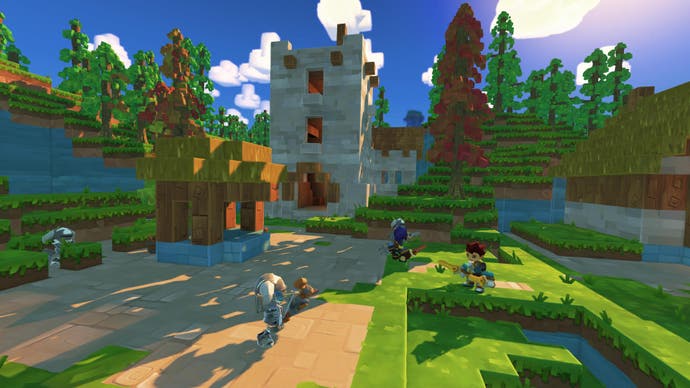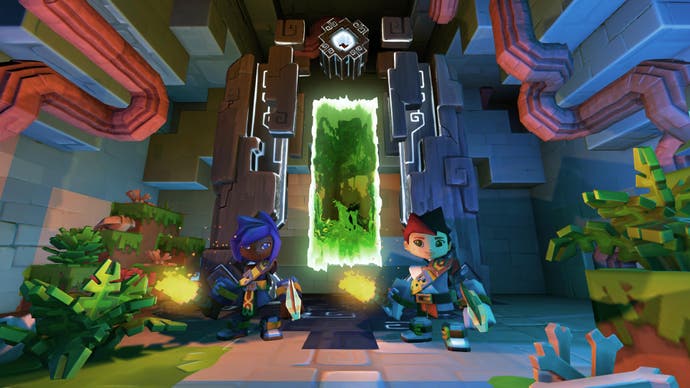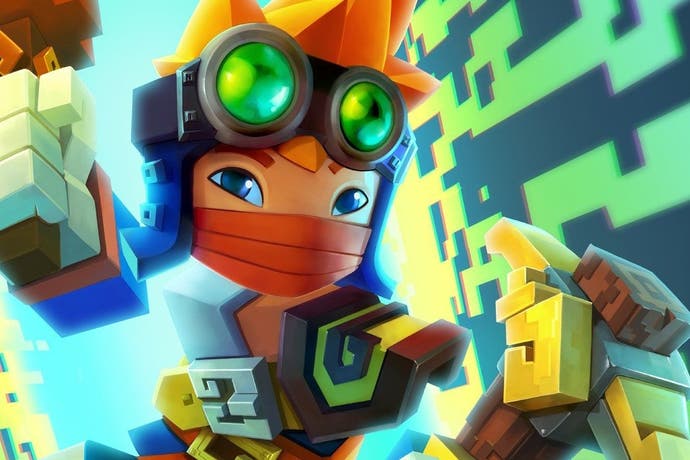SkySaga is the game The Oliver Twins always wanted to make
You're making me Dizzy.
Dizzy is never too far away.
Sat across from me in a roundtable session at Radiant Worlds, the new studio set up by the two men responsible for one of the 80s' most evocative gaming icons, are the Oliver Twins themselves. Andrew sips coffee from a mug emblazoned with a ZX Spectrum logo, while Philip's own mug proudly displays that lovable egg from the 48k era, their most famous creation.
We're not here to look back, though, and instead have been assembled to see what's next for the pair. Radiant Worlds is a relatively new studio, formed after the voluntary liquidation of the Oliver Twins' last company Blitz Games. Its first project, SkySaga: Infinite Isles, is a game the studio has been working on for just over a year. Developed in the UK in partnership with South Korean gaming giant Smilegate (they're paying the bills), SkySaga is, in a fair few of the developer's own words, a 'free-to-play, original, endlessly evolving, multiplayer, online, sandbox PC game.'
Original might not be the first word that comes to mind when you initially cast your eyes on SkySaga, though. Its debt to Minecraft is obvious from the off, from its UI to its colourful, simple and toy-like world. Look past that, though, and you might also glimpse the potential for something else entirely.
Players start the game on floating Home Islands, little outlets that hover in the sky. They're each persistent worlds that can be customised to the player's own liking - they can mine into it, place blocks or build whatever they like, and they're also afforded the option to decorate them with cosmetic items. It's these Home Islands that act as little hubs from which players can invite friends or strangers, allowing them to interact - or not - with the architecture and starting PvP games or heading out on co-op adventures.
It's these adventures that are at the heart of SkySaga. Designed to last approximately 40 minutes, they're mini-quests into procedurally generated environments in which players will be able to discover treasures and crafting components. SkySaga's own 'Adventure Director' generates these worlds, using different biomes as a canvas and filling them in with networks of villages, wells and caves. Each world has its own Zelda-style castle, which contains its own rewards - and it's this that players must aim for to find a portal back home.
There are no class types in SkySaga, and instead it's about crafting what you need for the task at hand. Frostier biomes may have greater rewards, but you'll have to create the right gear to tackle the elements, and players are free to specialise their equipment towards spelunking or, if they're the more homely sort, having a farm that churns out produce on their own islands.
On paper it's all promising stuff - there's the compulsion of loot you get in games like Diablo, the creativity that's made Minecraft a phenomenon and the promise of procedural exploration on which future prospects like No Man's Sky are being sold. There is, though, that free-to-play catch - how does it work, and how will it not impinge upon the freedom that's surely central to SkySaga's appeal?

"This is a free to play game where one of our biggest objectives is to make a game that's massively successful and popular," Philip Oliver tells us. "That's the number one goal, so we just want hundreds of thousands of millions of people playing this game. We then don't want to put any blockers in the way, we want people to be able to enjoy even if they don't put money in.
"When monetisation comes in we're going to be incredibly responsible about the practices we use. So there won't be any blockers, there won't be any pay to win or anything. It'll be items that you just want to sort of speed something up, if you just can't take the patience of finding something. We might have some cosmetic items people can show off that are like 'look I put some money into this' so you can tell because I'm wearing the golden bracelet or something and it's like 'man you must have spent some money on that!' but we don't want any blockers and no pay to win. The number one goal is the maximum number of players in the world playing this game."
It's a standard response, but it's fair enough. Another concern are Keystones, items required by players to open up portals to new world. Would there be a point where players needed to buy keystones with real world currency to access new adventures?
"In the basic loop of the game, the idea that we're experimenting with now is that you'll harvest these Keystones and find them on adventures," design director Ben Fisher explains. "You'll find components to make these and the time it takes to cook these or craft these takes real world time. We're looking at it at this stage as an appointment mechanic where you'll prepare tomorrow's adventures today. You'll find materials that'll allow you to make rarer or more advanced adventures. If you want to push into very, very rare locations, you'll have to find rare components to find the Keystone."

The idea of selling Keystones isn't off the table - it's something that's being considered as Radiant Worlds farms feedback from the newly commenced alpha - but they're still mindful of catering to all players.
"If you monetise too aggressively it'll undermine the creativity of the game," says Fisher. "The real balancing act for us is giving the player objectives and giving them things to draw their interest but leaving it open in a way that they're encourage to be creative and monetization is another thing that can squash the creativity."
As someone who loves playing games where the players make the stories, games like Minecraft and DayZ, it's hard not to get caught up in the enthusiasm Radiant Worlds have for SkySaga. In only 12 months it's made impressive progress, and the potential for it to grow into something special is definitely there - as long, that is, as it can rise above the stigma of its free-to-play model.
For the Oliver Twins, though, it's more than just a product they are selling. They insist it's the game they've always wanted to make: "When we first set about making Dizzy we wanted to create the Ultimate cartoon adventure," Philip tells me, referencing the box-out text on the front cover of the Spectrum classic. "With SkySaga, we feel like we've finally done just that."


